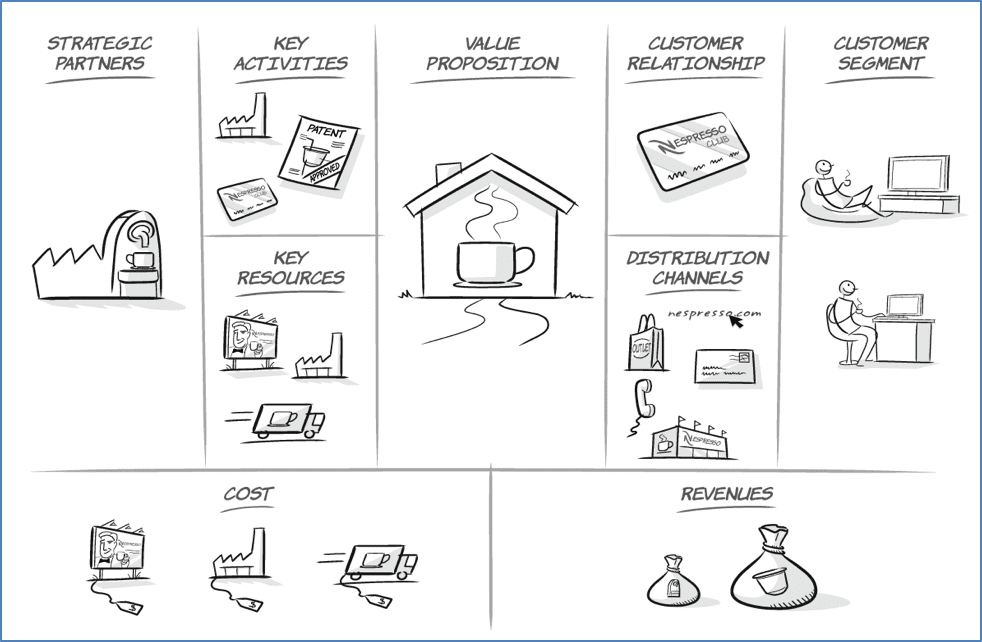In this step-by-step guide, we will show you how to start your freelance business. As homeworker you can be active with freelance assignments. But how do you start a freelance business?
Starting a freelance business is an exciting prospect. Benefits such as setting your own hours and following your passion are certainly attractive – but there is a lot of effort, strategy and planning involved in earning those benefits. In this article, we’re going to look at some of the key points you need to address before starting a freelance business.
When starting a freelance business you need to pay attention to: What a freelance business is. Why you want to start a freelance business. Understand what you want to achieve with your freelance business. Have a good picture of your personal financial situation. Make sure you really go for it. Set measurable goals. Find out what the business side of the business is. Start by figuring out your buyer personas. Determine pricing. Create and maintain an online presence. Network, network, network. Market yourself effectively. Maintain relationships and strengthen your reputation. Persevere when unexpected difficulties arise.
What is a freelance company?
A freelance business is a business set up and run by an individual who works for himself – generally through independent contract work. This can be as a main or secondary occupation. Freelancers are responsible for handling aspects of their business that typical employees would not, including setting their own hours, determining prices, pursuing contract work, and paying business taxes. Home Freelancers are freelancers who do their contract work from home.
Why start a freelance business from home?
- You are looking for the freedom and flexibility that comes with being accountable only to yourself.
- You intend to shape life and your industry to your liking.
- You want to work from home.
- You like to work on a contract basis.
In other words, you want to start your own home-based freelance business.

How can I start a freelance business step-by-step?
12 steps to take and consider when starting your freelance business. As a home-based freelancer, you are your own boss and it takes a lot to start successfully. Django vzw Thuiswerk Succes! supports home workers also as freelancers.
1. Understand what you want to achieve with your freelance business.
Before taking on big freelance business plans, you should know a lot about yourself and why you are starting your business in the first place.
Ask yourself some of the following questions – Why are you doing this? Is it to be your own boss? To set your own hours? To follow your passion? All of the above?
And how much time and effort are you prepared to put in? Is this going to be a supplementary income? Are you going to keep your day job?
You need to know the answers to all these questions – and many more – before you can really commit to starting your own freelance business. You can’t really know what you’re doing if you have no idea why you’re doing it in the first place.
2. Have a good picture of your personal financial situation.
The idea that you can drop everything to pursue your passion on your own terms is a daydream. That is why you have to be careful.
It is easy to romanticise the image of walking out of your office with a big smile on your face, knowing that you are about to do what you have always wanted to do, without having to answer to anyone.
It’s a nice concept, but you shouldn’t get carried away. You have to ground yourself, and understanding your personal finances is a crucial part of that.
Familiarise yourself with personal and business expenses and understand how long your savings can support you. Take a good look at your financial situation and determine where you could go wrong if things don’t go according to plan.
Understanding your personal finances will help you get a clear idea of what to expect, and give you an idea of how to deal with the problems that arise.
3. Make sure you really go for it.
If you want to succeed as a freelance entrepreneur, you have to go all the way. You have to find and maintain a special form of motivation.
You have to ask yourself some burning questions, such as – Am I willing to commit myself as fully as possible to this? Is this exactly what I want to do? Do I have a comprehensive plan? Do I really believe in that plan? Am I prepared to fail?
When it comes down to it, you have to believe in yourself, believe in your business, understand that it might not work out, and know that you are willing to stay the course to successfully start a freelance business.
4. Set measurable goals.
You need to set benchmarks to ensure that your business is making progress and that, personally, you are staying on track. It will also boost your self-confidence if you know that you are consistently reaching the milestones you have set for yourself.
Make sure the goals you set are SMART – specific, measurable, achievable, relevant and time-bound. Also make sure you set different types of goals – specifically short-term, long-term and ongoing.
A short-term goal could be, for example, that your website should have a certain number of monthly visitors within three months.
A long-term goal could be to achieve an annual turnover target within three years.
Finally, an ongoing objective can be to spend a certain number of hours each week approaching customers.
Make sure these targets are reasonable and outline a solid path for your business. Keep a close eye on them to better understand what you are doing well and what you could be doing better.
5. Find out what the business side of the company is.
You want to deal with the administrative and legal aspects of your freelance business before you actually start.
This can mean taking steps such as formally organising a business entity, getting an idea of your tax risks and becoming familiar with what your business contracts might look like.
You should also have a plan for managing your cash. How and when money comes in can be unpredictable when freelancing. You need to have an idea of how you will keep enough cash in hand to stay afloat.
Also consider setting up an infrastructure to help you manage your sales, marketing and customer service. A CRM is a good way to do that. At Django asbl, all Starters Websites have a built-in CRM.
Make sure you have worked out aspects such as bookkeeping, how your business is going to function on a day-to-day basis, and how you are going to save and manage your money before you actually start your freelance business.
6. Start by sorting out your buyer personas.
Start with a general survey of your target group. Get an idea of who your customers and prospects are. Consider approaching these people for surveys and interviews. This will help you understand what kind of buyer is right for your business.
From there, you can narrow down your base. Look for similarities between the potential buyers you have identified. Think about demographic factors, the way they want to be approached, behaviour and interests.
Once you have identified trends within your target audience, develop personas based on the different patterns you see. For example, if you are a caterer, you may notice that women in their 20s to 30s who book their children’s birthday parties or other family events make up a significant portion of your target audience. Use that information to develop a buyer persona specifically tailored to those qualities.
Give that group a name and boom! You have a buyer persona. Welcome to being a home entrepreneur, home freelancer and home hobbyist.
7. Determine pricing.
When determining the price, it is important to consider how you want to charge the customers.
Will you work on an hourly basis? Will you charge a fixed fee? Will you use project quotes? It is important to determine how you are going to make money before you actually start making money.
Once you have determined your pricing structure, you can start calculating how much your services will cost. You can start by researching industry averages. You should be able to find some solid figures online. Sites like IkStartMijnZaak, Payscale and Glassdoor are good places to start.
It may also help to contact other professionals in your field to see what they charge and how those price points work out for them.
Bear in mind that this is not an exact science. Finding the right price for your services will probably take some trial and error. You have to keep experimenting until you get it right.
8. Create and maintain an online presence.
You need to get a website up and running as soon as possible. That will be the first contact with many of your customers. Django vzw delivers great websites for freelancers.
A good-looking website that is easy to navigate assures potential customers that your business is legitimate and professional.
A well-structured, visually appealing website can also set you apart from other freelancers in your industry. You can use it to give your prospects an idea of your services, portfolio, and prices.
You also want to build a solid social media presence. Reaching customers through social networks is becoming essential for any kind of business – and freelancers are no exception.
A strong social media presence is incredibly important when it comes to communicating with existing customers to keep them interested in your business. Our online media marketing services are here to help with your Home Business Success!
Create and develop profiles on different social networks. The more likes and followers you can gather, the more trustworthy and established your business will seem.
9. Network, network, network.
You cannot do business without contacts. That is like trying to drive a car without petrol. But networking is much easier in theory than in practice.
It takes a lot of energy, and it is often difficult to know where to start. It will undoubtedly be difficult, but the success of your business may depend on whether or not you make the effort to network effectively.
Start by finding out where your target buyers are – both online and offline. Then use that information to develop a marketing and networking strategy that meets them where they are.
Attend local meetings relevant to your industry to make personal contact with potential prospects and fellow professionals in your industry. It also helps to stay active in online forums about the areas your business covers.
Make sure you use social media to keep consistent contact between yourself and your potential buyers, but also between yourself and your fellow professionals.
As I said, you can’t do business without contacts, and it’s not easy to make those relationships. It is also difficult to maintain those contacts once you have them, but do not get discouraged.
If you make smart, dedicated efforts to reach out and connect with prospects and fellow professionals, you should be able to build a productive network for your business.
10. Market yourself effectively.
You need to develop a solid content marketing strategy. Blogging is an essential part of that process. When you do, make sure you write content that is generally relevant to your field – not just specific to your own business.
You want to establish yourself as a leader in your industry. That can give you the kind of credibility your business needs to stand out.
You want to show that your business is legitimate. The best way to do that is to show that you really know what you are talking about when it comes to your field.
You will also want to write content offers to attach to your blogs to convert website visitors into leads. A content offer is a product such as a white paper or an eBook with information relevant to your field.
You can use content offers to attract and retain contacts. Have a reader fill out a contact form to download your content offer. By doing so, you identify that reader as a potential lead.
You should also actively promote content on social media – and it doesn’t always have to be your own. You can actively post other thoughtful content from other outlets in your industry. By doing this, you can let your followers know that you are staying on top of the trends in your industry.
Your content marketing strategy can shape your reputation. If you create and promote enriching content that will benefit your readers, you will stand out as an authority in your industry.
11. Maintain relationships and strengthen your reputation.
One of your first priorities will always be to maintain the customer relationships you establish. You should do everything in your power to satisfy your customers and keep them close to you.
This means staying in touch consistently and providing exceptional customer service.
Positive word-of-mouth can be a huge boost to starting your freelance business. Satisfied customers can provide that, and even more satisfied customers will do everything they can to provide that.
Als je kunt, zorg dan voor beoordelingen van klanten om op je website zet. Django vzw kan dit integreren in jouw Django Starter Website.
12. Persevere when unexpected difficulties arise.
You have to be prepared to stay the course if you want to make it. Chances are you will not see brilliant results right away, and it will probably take a lot of time and effort before you do.
You must prepare yourself for success and do everything possible to achieve the goals you have set for yourself. You will encounter hiccups. Some things will not go right. You will definitely face some difficult moments.
Nevertheless, you have to be professional and persistent, and do everything you can to serve your customers in the best possible way. That will put you in the best possible position to make it.
It will not be easy. But if your head and heart are in the right place, it will be worth it.
Closing
When starting a freelance business, you need to pay attention to many things. Foremost, you should make a conscious decision to work freelance, and then you should have a clear goal. Both your financial situation and pricing should be considered carefully. A modern website with a solid online presence is necessary. Your marketing strategy can be SMART. And you need to maintain your reputation online and offline. Finally, you can expect hard times, keep going.


